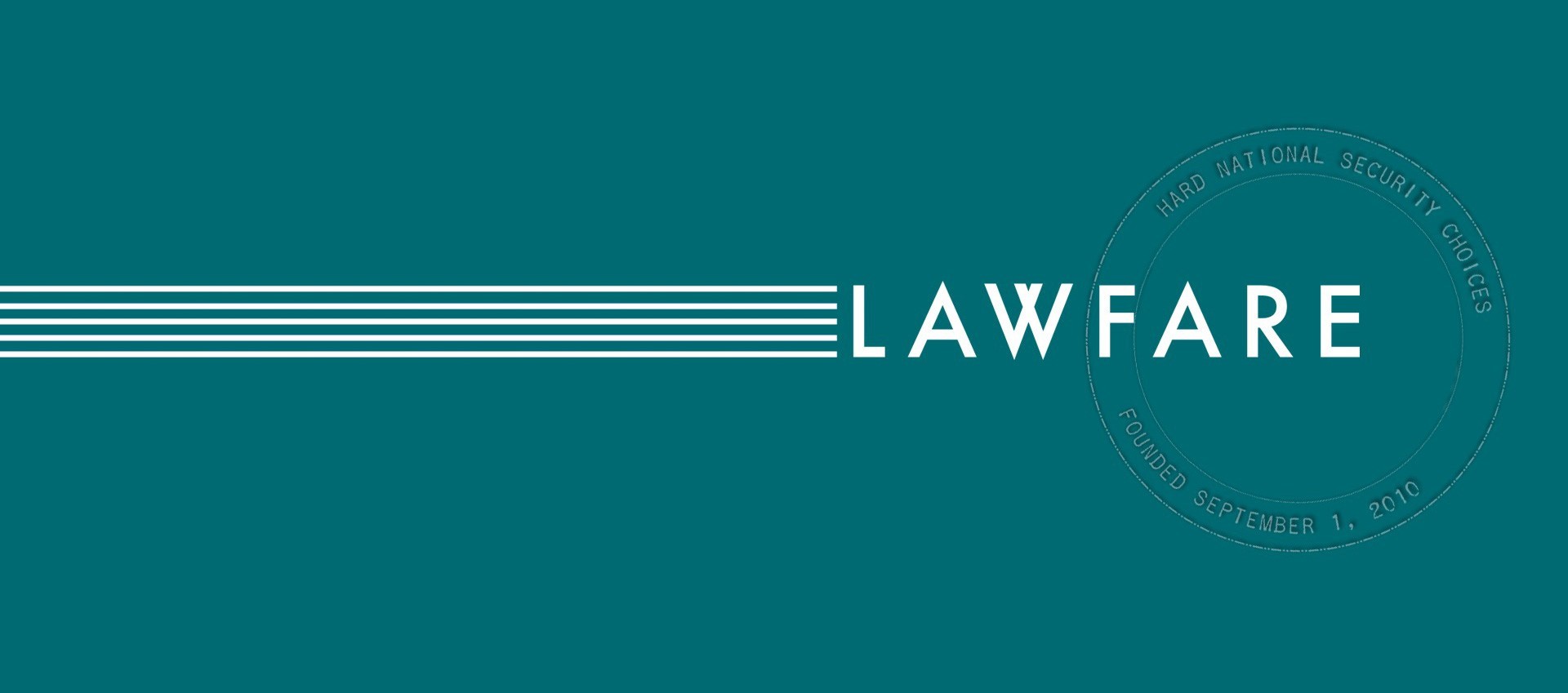Published by The Lawfare Institute
in Cooperation With

Quinta Jurecic and Roger Parloff discussed the key takeaways from Volume 1 of Special Counsel Jack Smith’s final report on the Jan. 6 prosecution of President-elect Donald Trump. They broke down Smith’s reasoning behind not filing certain charges, how he navigated election year sensitivities, and more.
Following its release by the Justice Department, Tyler McBrien shared the first half of Special Counsel Jack Smith’s final report of his more than two-year investigation, a 137-page volume entitled “Report on Efforts to Interfere with the Lawful Transfer of Power Following the 2020 Presidential Election or the Certification of the Electoral College Vote Held on January 6, 2021.”
Bob Bauer reflected on voters’ seeming indifference toward the Department of Justice’s now defunct cases against president-elect Donald Trump, and discussed the “extraordinary steps Trump is taking to make the Justice Department his own.”
Benjamin Wittes reflected on Attorney General Merrick Garland’s farewell address, in which he spoke to the importance of an independent Department of Justice. Despite the criticism that has been levied against Garland’s approach on all sides, Wittes affirmed the department’s need to maintain integrity and uphold the rule of law.
On Rational Security, Scott Anderson sat down with Parloff, McBrien, and Renée DiResta to discuss major national security news from the past week. They talked about the coming end of legal cases against Trump, corporate America’s shift to the right, Trump’s threats to take control of Greenland and the Panama Canal, and more.
On Lawfare Daily, Wittes spoke to Anna Bower, Anderson, and McBrien about the second day of confirmation hearings for president-elect Donald Trump’s cabinet. They discussed hearings for Pam Bondi’s nomination to be attorney general, John Ratcliffe’s nomination to be CIA director, and Marco Rubio’s nomination to be secretary of state, and how collegial or contentious each hearing was.
On Lawfare No Bull, Caroline Cornett shared the audio from Bondi’s confirmation hearing in front of the Senate Judiciary Committee on Jan. 15.
Also on Lawfare No Bull, Olivia Manes shared the audio from Ratcliffe’s confirmation hearing in front of the Senate Intelligence Committee on Jan. 15.
And on Lawfare No Bull, Anna Hickey shared the audio from Rubio’s confirmation hearing in front of the Senate Foreign Relations Committee on Jan. 15.
On Lawfare Daily, Wittes spoke to Bower about secretary of defense nominee Pete Hegseth’s confirmation hearing before the Senate Armed Services Committee.
Wittes reacted to Hegseth’s confirmation hearing, highlighting the brash approach Hegseth took when questioned about his apparent lack of qualifications for the position as demonstrative of a broader Trump-era ethos towards governance.
Wittes also evaluated Bondi’s performance in her confirmation hearing before the Senate Judiciary Committee on her nomination to be attorney general. He noted that despite the fact that her remarks “bore a semblance of normalcy” compared to those of other Trump cabinet nominees, the real test of her normalcy—and her limits—will occur when the president-elect inevitably makes unlawful or normatively improper demands of the Department of Justice.
On Lawfare No Bull, Cornett shared the audio from Hegseth’s confirmation hearing in front of the Senate Armed Services Committee on Jan. 14.
Alan Rozenshtein described the ramifications of the Supreme Court’s unanimous decision to uphold the Protecting Americans from Foreign Adversary Controlled Applications Act (PAFACAA), which bans TikTok from operating in the United States. Rozenshtein discussed the immediate effects the law will have on TikTok users and U.S.-based servers, the fate of other Chinese-owned video apps, and the limited actions President-elect Donald Trump could take to keep the platform afloat.
Andrew Woods argued that the Supreme Court’s ruling against TikTok marks the end of internet freedom in U.S. technology policy and may set a precedent for foreign countries to justify their own bans on American technology companies. Woods also suggested that the decision—which justifies a speech ruling on privacy grounds—creates a pathway for constitutional contestation for other cases concerning platform content regulation practices.
Katherine Pompilio shared the Supreme Court’s 9-0 decision upholding the constitutionality of PAFACAA, which bans TikTok beginning Jan. 19 unless its parent company, ByteDance, divests.
On Lawfare Daily, Kevin Frazier sat down with Rozenshtein and Ramya Krishnan to dissect the Supreme Court oral arguments over the legislation poised to ban TikTok, how they thought the Court might rule, and more.
Nathan Sanders and Bruce Schneier argued that increasing pressure to write more detailed laws—driven by the Supreme Court’s decision to overturn the Chevron doctrine and political polarization— means Congress will increasingly turn to artificial intelligence (AI) to draft laws, concentrating more power in the legislature.
On Lawfare Daily, Lennart Heim and Janet Egan joined Frazier to analyze the interim final rule on AI diffusion announced by the Bureau of Industry and Security on January 13, 2025, which could have major ramifications on the global race for AI dominance.
Cameron Kerry and Shane Tews argued that the incoming administration should not revoke or make changes to Executive Order (EO) 14086—which forms the basis for the EU-U.S. Data Privacy Framework—because any disruptions to the framework would threaten data flows crucial to both the U.S. and European economies.
James Brower and Nicholas Weigel outlined legal challenges investors may raise against the Committee on Foreign Investment in the United States, posing new tests to its jurisdiction, administrative procedures, and enforcement powers.
Colin P. Clarke, Camden Carmichael, and Seamus Hughes explained the significance of the U.S. State Department’s designation of Terrorgram Collective as Specially Designated Global Terrorists. Unlike previous designations, the designation of Terrorgram Collective—which has adherents in the United States—will directly affect American citizens.
On Lawfare Daily, Jennifer Gellie, chief of the Counterintelligence and Export Control Section in the National Security Division of the Department of Justice, joined Anderson and Brandon Van Grack to discuss new regulations her office has proposed for implementing the Foreign Agents Registration Act.
In the latest installment of Lawfare’s Foreign Policy Essay series, Jayita Sakar explained how North Korea procures Namibian uranium for use in nuclear weapons development through its relationships with China and Russia, and argued that the incoming Trump administration should make putting a stop to this a diplomatic priority.
Erin Sikorsky and Tom Ellison suggested that rapid advances in geoengineering research coupled with a lack of effective governance creates security risks. Sikorsky and Ellison argued that international consensus on research and increased efforts to reduce misinformation are key to meeting climate and political challenges.
Erica Resende explained how use of the term “post-Soviet” negatively impacts Central and Eastern European states by undermining their political and social transformation since 1991 and legitimizing Russian imperialism.
And Tadeusz Koczanowicz analyzed the positive reaction of Poland’s right-wing Law and Justice party to Trump’s reelection. Despite the party’s widespread belief that Trump’s election will spark a “red wave” in Europe, Koczanowicz suggested that unpopular policy positions make it unlikely that Law and Justice will return to power.
And that was the week that was.




